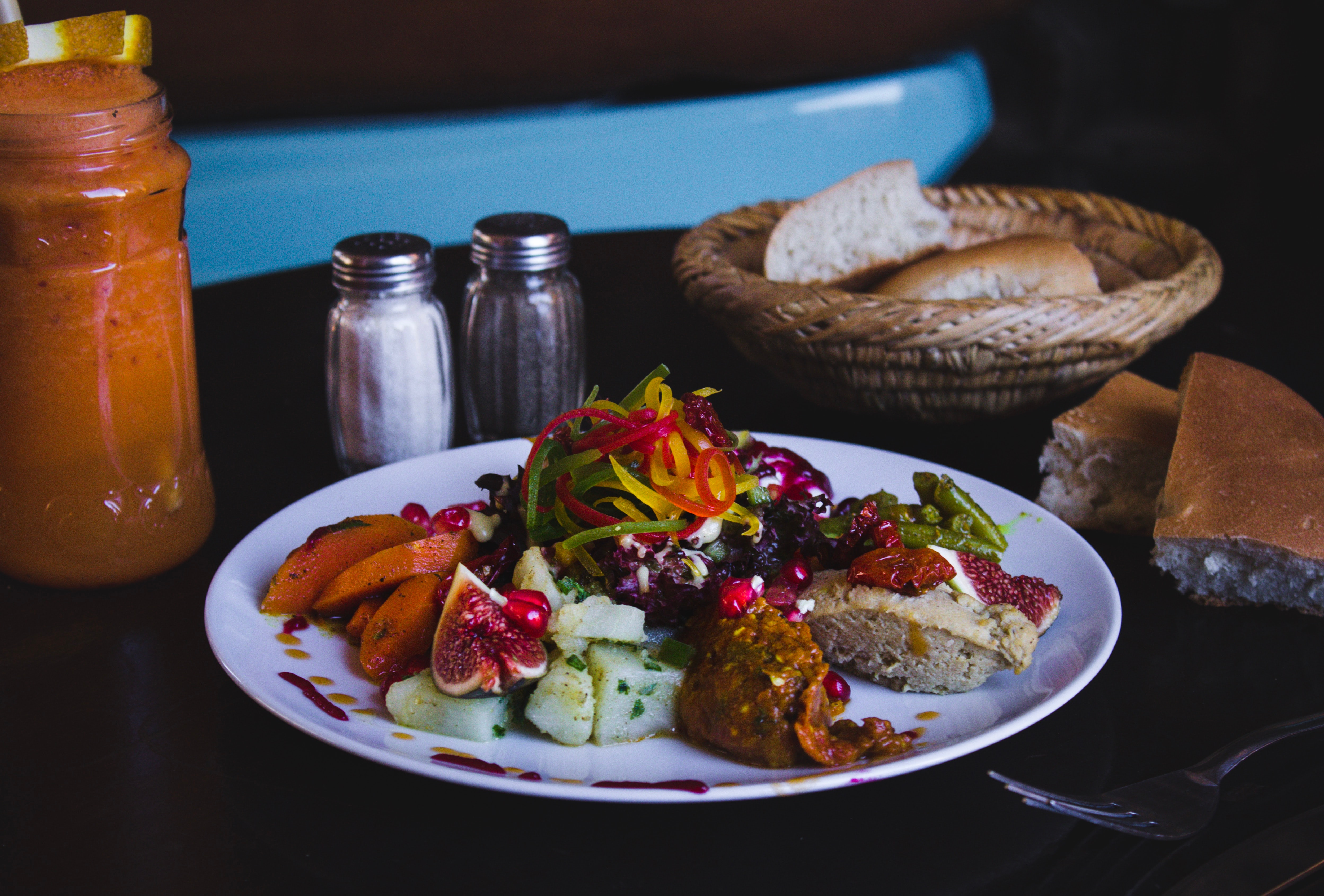Perhaps more than anywhere on earth, Israel stirs up strong emotions and associations among travelers. Politics. Pilgrimage. History. Conflict. Ask a table full of friends about this narrow Middle Eastern nation and it’s likey they’ve got hot takes. And counter-takes. And counter-counter takes. Even a not-yet-taken trip to the country leaves you with a lot to wrestle with.
When I made plans to return to Israel after several years away, I didn’t invite geopolitical opinions. My immediate aims were simpler, more sensory. I dreamt of the food, the taste of shakshuka and falafel. I fantasized about the weightlessness of floating in the Dead Sea, the salt making my skin tingle. I planned out which nightclubs I’d hit, dancing to famed Israeli house DJs until I was left sweaty and exhausted.
Sure, I hoped to better understand Israel, too. It’s hard to book a ticket without troubling over larger concerns on some level (my editor kept me on the phone for an hour discussing these). But it takes a lot of experience and knowledge to speak about the country’s place in the world with authority. Until I have that level of knowledge, I still believe you can go to Israel just to visit. Yes, I wanted to learn, but I wanted to do it by experiencing the culture.
This goal demanded one element I didn’t have on hand: cash. Israel may be hotly debated in a million different ways, but the fact that it’s not cheap is pretty much common knowledge. Tel Aviv was voted the tenth most expensive city in the world by the Economist Intelligence Unit’s Worldwide Cost of Living Survey. This means if you’re going to see Israel on a budget, you’ll have to work at it.
The rewards — both in authentic experiences and savings — are well worth the effort. Here’s how it can be pulled it off:
Affordable Stays In Israel

Abraham Hostel
If you’re looking to make friends, there’s probably no better option than Abraham. It’s a trendy hang out spot where you’ll find the ultimate travel crew to day-trip with. They have properties in Jerusalem, Tel Aviv, and Nazareth, but their Tel Aviv location is definitely my favorite. It’s centrally located — just two minutes walking distance from the famed Rothschild Boulevard, ten minutes to the Carmel Market, and twenty minutes to the beach. It’s also massive: their colorful and spacious lounge comes complete with a kitchen (which helps if you’re on a budget), hammocks, couches, tables, and daybeds that are perfect for chilling. There’s also a rooftop, a restaurant, TV room, laundry room, and free breakfast.
Rooms vary by night and season but a 12-bed dorm runs about 80 NIS ($22) a night — that’s a dang steal.
The Brown Hotels
If you’re on the hunt for a budget hotel option with a boutique feel and a cool, funky design, try a spot under the Brown Hotel banner. I stayed at Dave Gordon — Son of a Brown in Tel Aviv and my room came with a bathtub in the center and a large statue of a penis, which really set the intention for my trip (no, I will not be clarifying).
Dave Gordon is located a stone’s throw away from the beach and costs around 492 NIS ($130) a night.
Kibbutz Hotels
A kibbutz is an Israeli community settlement or commune. Think of it as the ultimate example of socialist living: everyone works and everyone shares. All kibbutzim run their own industries, like manufacturing products or running hotels. While on the road or in between destinations, you might want to find a local kibbutz hotel for an affordable stay that allows you to take part in a unique Israeli custom.
I suggest the Nof Ginosar Hotel, which is located on the Sea of Galilee and was actually the first Kibbutz hotel to be built in Israel. Rooms are nothing fancy but provide all the essentials and start around 540 NIS ($150) a night.
Getting Around

In Tel Aviv:
Tel Aviv is a pretty walkable city as it’s not too spread out, and walking is the best way to save money (your feet are free!). If walking isn’t an option, many people use Gett (the Israeli version of Uber), or just hail down a cab (though these can get pretty pricey). Alternatively, the bus system is great and only costs 5.90 NIS (around $1.60) per ride. It’s important to note that as of 2019, you’ll need to use a Rav Kav card preloaded with money to ride. The Rav Kav card costs 5 NIS ($1.30) and can be loaded at any of the bus or train stations as well as at the airport.
Disclaimer for public transit: On Friday nights, the transit systems shut down for Shabbat, so don’t plan any major travel then. You’ll be out of luck and you won’t have anyone to complain to because they’ll be eating brisket with their families while you wander aimlessly through the empty streets wondering why nobody’s getting lit on a Friday. It’s kinda great, honestly. Every Friday night is like Coachella weekend in Los Angeles — not a car or floppy hat in sight.
Further Afield:
Israel Railways is efficient and highly affordable. From Tel Aviv-HaHagana station, it costs 22 NIS ($6) to get to Jerusalem, 27.50 NIS ($7.50) to get to Haifa, 35.50 NIS ($9.80) to Akko, 27 NIS ($7.45) to Be’er Sheva, and 13.50 NIS ($3.70) to get to Ben Gurion Airport.
A shuttle service also runs between the Jerusalem and Tel Aviv Abraham Hostel locations through their service Abraham Tours and costs $8, if you plan on staying at Abraham in both cities.
To get to other major highlights outside of Jerusalem and Tel Aviv, you can go solo, with friends, or book a tour through your hostel. This latter option is time, energy, and headache-saving. Plus, it’s a great way to meet other travelers who can take pictures of you if you’re traveling solo (no shame in that Instagram hustle game). I did a Petra tour, but the West Bank, Egypt, Masada, and the Dead Sea all also have a slew of themed cultural tours and pub crawls on offer.
Where to Find Cheap Eats

You can find affordable food in Israel, you just have to know where to hunt. For cheap falafel, head to Falafel Razon (King George St 17) in Tel Aviv for a fresh, huge falafel pita for only 6 NIS ($1.60). Insider tip: grab your falafel and head to The Little Prince Bookshop and Coffee House a couple of doors down (King George St 19) where you can sit outside on their patio, read books, drink a “kaffei hafukh,” (comparable to a cappuccino), and feel high class and budget.
Another great dining option is the Sarona Market, a culinary melting pot located in a large park surrounding a restored German Templar village from 1871. Israeli food is influenced by dozens of countries — reflective of the Israeli diaspora and the Middle East at large — which you really feel at Sarona. There are over 90 restaurants, grocery huts, and shops to choose from. Each one is a unique piece of the fusion that makes Israeli food so dynamic. While some restaurants can run a bit pricey, there are plenty of smaller, less expensive vendors that offer a tasty dessert or a filling sandwich that won’t break the bank.
It ought to be a punishable crime to go all the way to the Middle East and not bury your face in a pan of shakshuka. Shakshuka is a breakfast dish (eggs cooked in a tomato sauce with herbs, chili peppers, and garlic) that’s the perfect balance of spicy, sweet, and savory. If you want a mind-blowing breakfast that you’ll crave back home, head to Dr. Shakshuka. This spot is just to the side of the Jaffa Flea Market (3 Beit Eshel St). You’ll find a courtyard of long, communal tables and an affordable meal consisting of dozens of small vegetable salads (they’re like the Israeli tapas), shakshuka, and a tub of bread. Who doesn’t want a tub of bread?
If you’re looking for budget food outside of Tel Aviv, simply look for the hawkers and vendors selling from their carts. If you want cheap + flavor, that’s your bet worldwide.
Free or Low-Cost Fun

This is the time to enjoy the fun (and cheapness) of wandering. Head to the beach, stroll through adorable little neighborhoods like Old Jaffa and Neve Tzedek in Tel Aviv or visit the Nahalat Binyamin Arts and Crafts Market for some creative inspiration.
In the Old City of Jerusalem, you can visit the Western Wall — the holiest site for Jews, built in 20 BCE. It’s free to see and open all day, year-round. Note: women should have their shoulders and knees covered and men are encouraged to cover their heads out of respect. If you choose to do so, it is customary to write a note with a prayer or a wish and leave it in the wall. Additionally, the Church of the Holy Sepulcher is free of charge and is the place where, according to the Bible, Jesus is said to have been crucified, buried, and resurrected.
For a taste of the famous Israeli nightlife, try to save enough for a night out with the tour company Tel Aviv Nights (which made it into our 2020 Travel Hot List this year). The company offers pub crawls in Tel Aviv and Jerusalem that cost around $25. That gets you a free beer, five free shots, and free VIP entrances to trendy underground bars and clubs that you definitely would not have found on your own. According to tour-guide lore, people keep meeting their spouses on these pub crawls so, ring fingers up!
Other highlights include clearing up your psoriasis at the Dead Sea, visiting the ancient city of Akko (there’s literally a hangout room where men used to poop together), or chilling with hippies in Tzfat, the birthplace of Kabbalah (remember when Madonna tried to make it a thing? Thanks for making it weird, M).
Something you most definitely should not miss is a tour of Yad Vashem, The World Holocaust Remembrance Center. While painful and obviously not “fun,” it’s a supremely meaningful and chilling experience. Yad Vashem includes indoor and outdoor museums that house nine haunting galleries that recount the horrors of the Holocaust using a range of multimedia. There’s no entrance fee and it is something that you will, undoubtedly, never forget.
***
Every traveler has different considerations when visiting Israel. Embrace that. Mull it all over. Then visit the nation with your eyes wide open, continually adding context to your previously held notions. In the process, slow down to savor the nation’s more sensory aspects. The smells of spices in the market, the sound of various calls to prayer twining together, the kind eyes of vendors.
Israel isn’t just a place to argue over. It’s a destination to experience. And no matter how budget-minded you go, I’m ready to bet that those experiences are worth every penny.
Uproxx was hosted for this story by the Israeli Tourism Board. However, they did not review or approve this story. You can learn more about the Uproxx Press Trip policy here.







